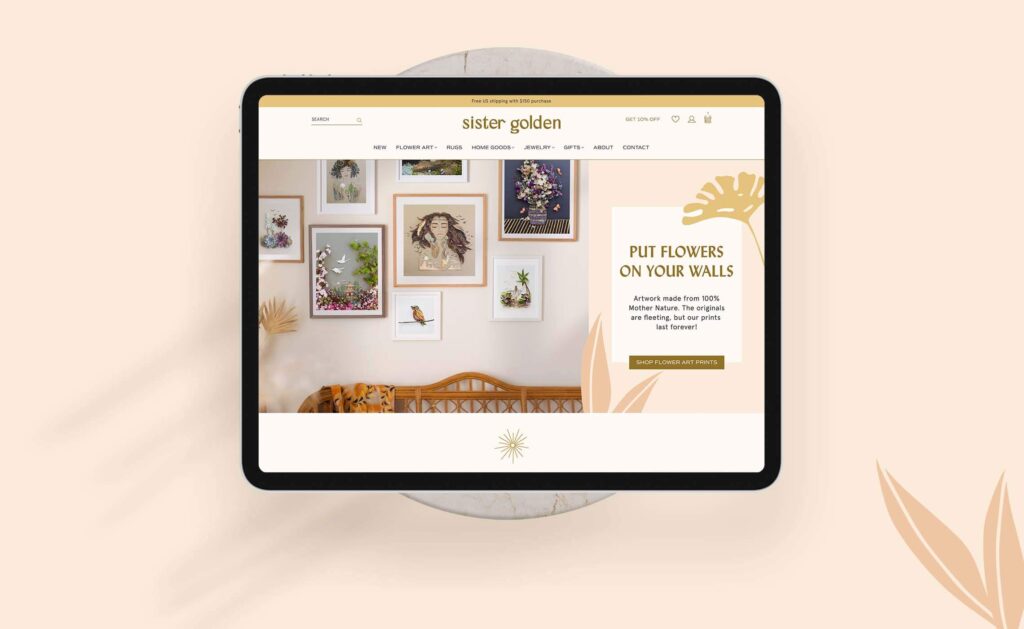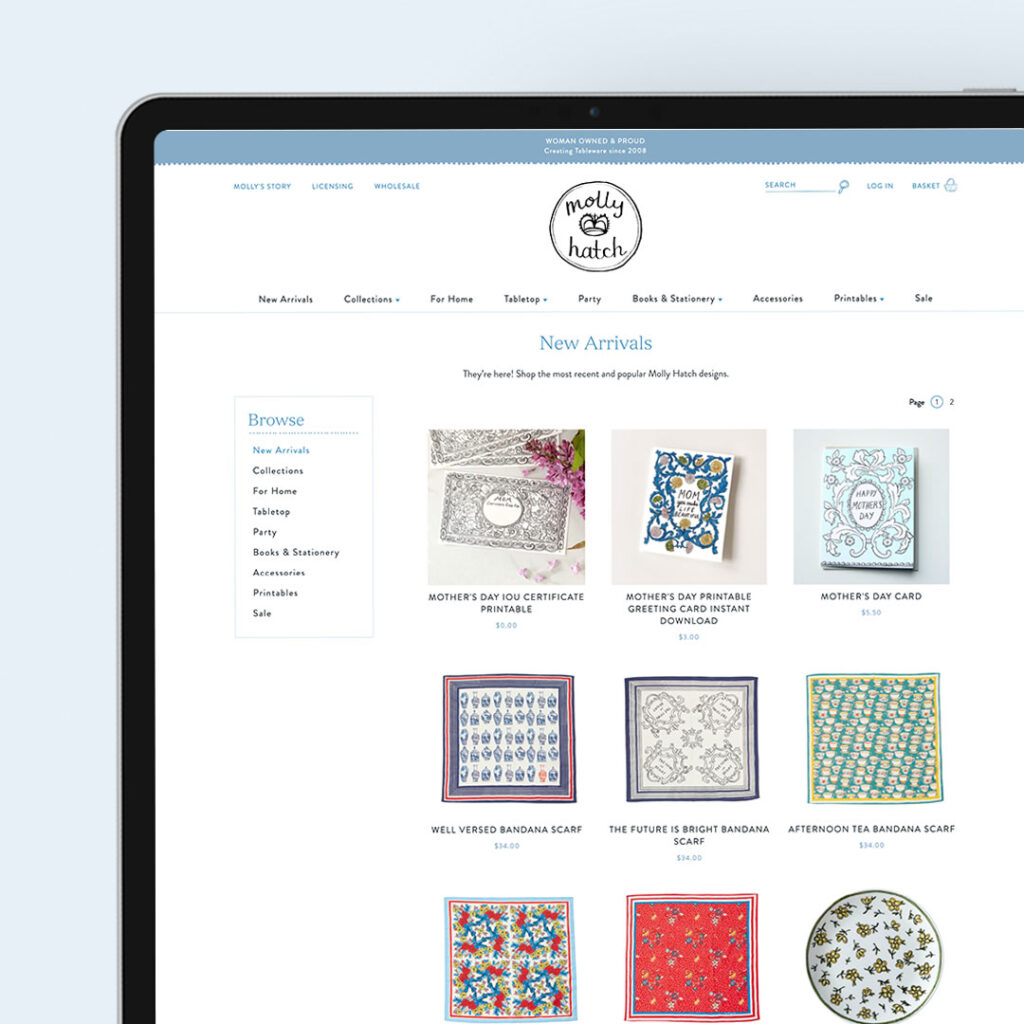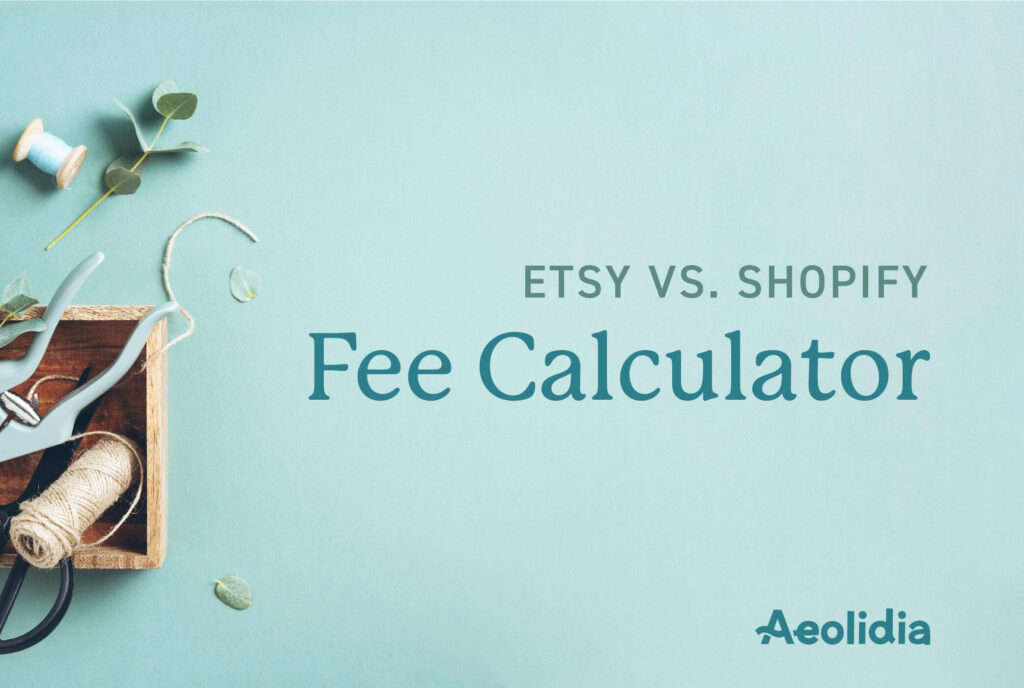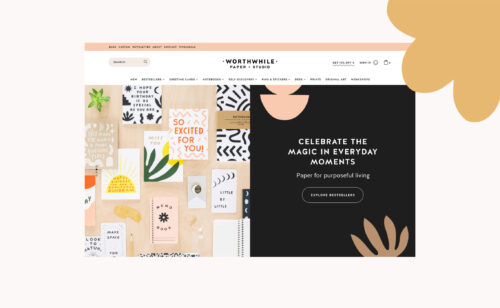Shopify vs Etsy: Why Shopify is the Best Platform for Makers

If you own a handmade business, choosing an ecommerce platform is just one of the many super-fun decisions you’ll get to make! Yes, there are quite a few options out there. Many business owners in our community start off on Etsy, but inevitably find themselves wondering if Etsy alone can support their growing business. Another common quandary is Shopify vs Squarespace. If you are pondering Shopify vs Etsy, this blog post is for you!

Shopify: the versatile ecommerce giant
When we first started making ecommerce websites for crafters back in the day, the software landscape was, well, different. We made do with some clunky software! Thankfully, Shopify has emerged as the leading ecommerce platform, offering a robust set of features to create and manage online stores. Let’s delve into its key advantages:
- It’s hosted software – Shopify is your web host, and you won’t need to purchase a separate hosting account. You won’t be responsible for upgrading the shop software (or hiring someone to upgrade it for you, or, worse, not upgrading it and ending up with a hacked site). Shopify will automatically roll out upgrades, bug fixes, and security improvements. We don’t get complaints from our clients about sites being down or getting hacked.
- Shopify is user-friendly – Our clients have an easy time adding their products and managing orders with the simple and clear back end management tool (which is also available as an iPhone app). Shopify also has an extensive knowledge base including how-to guides, courses, great documentation (including videos), customer support, and an excellent blog. I’m constantly sharing their articles!
- Flexibility and customization options – Shopify provides a wide array of professional templates and customizable themes, enabling businesses to create visually appealing and unique storefronts. Its intuitive drag-and-drop interface allows users to design their websites without any coding knowledge. Also, Shopify isn’t just your shop, it’s your whole website, including informational pages, and even a simple blog. Everything can be fully customized; Shopify allows us to dig into the HTML, CSS, and Liquid code to develop any design we dream of. If you are looking to take your current Shopify theme to the next level, check out our Simple Shopify Design service.
- You can hire an expert – The Shopify Experts directory can connect you with a reputable company to help you with your ecommerce business. You’ll find vetted experts in marketing, sales, store setup and development, content creation, and more!
- Extensive app store – With over 4,200 apps available in the Shopify App Store, businesses can enhance their stores’ functionality and expand their capabilities. From marketing and inventory management to customer support and analytics, Shopify’s app ecosystem caters to diverse business needs.
- Powerful SEO and marketing tools – Shopify empowers businesses to optimize their online presence through built-in SEO features, facilitating higher search engine rankings. Additionally, it offers various marketing tools, such as discount codes, abandoned cart recovery, and social media integration, to attract and retain customers effectively.
- Reliable payment processing – Shopify’s integrated payment gateway, Shopify Payments, streamlines the checkout process, ensuring secure transactions for customers. Shopify works with over 70 payment gateways, and allows multiple languages and currencies.
- Best-converting checkout – In a recent independent study, a leading global management consulting company found that Shopify’s overall conversion rate beats the competition by 15% – 36%! This can be attributed to four advantages: Shopify’s massive identity network, unmatched scale, consumer trust, and velocity of innovation.
- Scalability and growth opportunities – As businesses expand, Shopify accommodates their evolving needs. Whether it’s handling high-traffic volumes, integrating with third-party logistics providers, selling wholesale, or managing multiple sales channels including POS, Shopify’s scalable infrastructure facilitates growth without compromising performance.

Etsy: a unique marketplace experience
While Shopify caters to businesses seeking full control over their online stores, Etsy offers a distinctive platform that focuses on handmade and vintage products. Here’s what sets Etsy apart:
- Targeted audience – Etsy boasts a dedicated community of buyers interested in handmade and unique items. Sellers can tap into this niche market and leverage Etsy’s built-in traffic to reach a highly targeted audience. This can be advantageous for businesses specializing in artisanal products.
- Ease of use – Setting up a store on Etsy is relatively simple, making it an appealing option for beginners or those with limited technical expertise. Sellers can list products quickly and take advantage of Etsy’s intuitive interface to manage their inventory and sales.
- Brand exposure – Etsy provides an excellent platform for artisans and small businesses to showcase their products to a global audience. With millions of active users, Etsy offers substantial exposure and the potential for increased brand recognition. Sellers benefit from the organic search visibility within Etsy’s marketplace, which can save time and resources.
- Fee per transaction – Etsy operates on a transaction fee model, charging a percentage for each sale made through the platform. While this may seem convenient initially, sellers should carefully evaluate the impact of these fees on their profit margins, especially for higher-priced products.
Benefits of moving away from Etsy
- Position you as a legitimate business.
- Make it easier for you to form long-term relationships with your customers.
- Increase your ability to work with wholesale clients.
- Give you more design options.
- Provide more features and functionality.
- Allow you to easily adapt as your business grows.
- Potentially save money.
Comparing Fees: Shopify vs. Etsy

When you are first getting started with ecommerce as a product-based business, it can make sense to set up shop on Etsy to test the waters, or test your proof of concept. Will your products sell? Are there adjustments you can make to your photography to make your products more appealing online? How can you bundle your products together for more sales? The list of things you can test out as you are beginning your business is long, and Etsy is an easy platform to use for that testing period.
Once your business has grown, and you are ready to make the leap into setting up a shop on your own domain (www.yourshop.com, not www.etsy.com), where should you go? When new clients write to us, one of their concerns is the fee structure on Shopify. When does it make sense to set up your own shop? Will your monthly expenses increase? How do Etsy and Shopify fees compare? Well, I did the math!
Calculate your Shopify fees vs. your Etsy fees with this free tool to see which is a better choice for you.
Browse Posts
A Newsletter That Goes Beyond Shopify 101
It’s easy to find beginner info about ecommerce online. If you’re past that? Subscribe to our newsletter for advanced strategies and need-to-know info for established shops.
Learn how the top shops grow:
"*" indicates required fields
Related Posts
Let's take your online shop to the next level
The Shopify websites we design have a reputation for substantial improvements to ecommerce conversion rates and online sales. Let's talk!
 Grab my guide to the 10 main ways to grow traffic and optimize to boost sales.
Grab my guide to the 10 main ways to grow traffic and optimize to boost sales.


